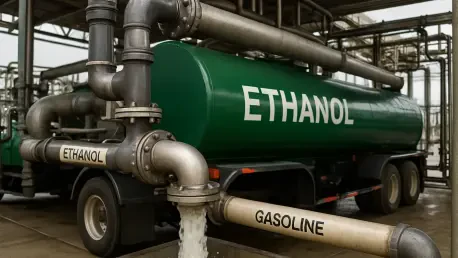In a world increasingly focused on sustainable energy solutions, India stands at the forefront with its ambitious ethanol blending program, particularly the push for E20 fuel—a blend of 20% ethanol with gasoline. This initiative, designed to reduce carbon emissions and enhance energy security, has faced challenges from misinformation spread across social media platforms, often casting doubt on the fuel’s safety for vehicles. Yet, a powerful counterforce has emerged in the form of digital influencers who are leveraging their reach to educate the masses and dispel myths. Backed by government efforts through the Ethanol Blended Petrol (EBP) Program, this movement is gaining traction, showcasing a unique blend of technology, policy, and public engagement. The role of online voices in shaping perceptions about clean energy alternatives highlights a modern approach to addressing environmental challenges and fostering economic growth.
Digital Voices Shaping Public Perception
Amplifying Awareness Through Social Media Platforms
The rise of digital influencers has become a game-changer in promoting India’s E20 fuel initiative. Prominent creators from varied fields—entertainment, finance, and media—such as Abhishek Malhan, widely known as Fukra Insaan, and Mahesh Keshwala, popularly called Thugesh, have taken to their platforms to champion the benefits of ethanol-blended fuel. Their engaging content breaks down complex topics into relatable messages, reaching millions of followers who might otherwise remain unaware of such programs. By addressing common concerns, like the fear that E20 fuel could harm vehicle engines, these influencers provide clarity and reassurance. Their efforts align with a broader goal of fostering public trust in sustainable fuel alternatives, demonstrating how digital spaces can bridge the gap between policy and public understanding. This wave of online advocacy has proven instrumental in countering false narratives that threaten to undermine the program’s progress.
Debunking Myths with Facts and Credibility
Another critical aspect of influencer involvement lies in their ability to combat misinformation with factual insights. Many social media users have spread unfounded claims, such as the notion that insurance companies refuse to cover damages linked to E20 fuel usage. Influencers, supported by statements from the Ministry of Petroleum and Natural Gas, have clarified that such assertions lack evidence and do not reflect reality in India. By sharing verified information, these digital voices help dismantle myths that could deter the adoption of cleaner fuels. Their diverse backgrounds add layers of credibility, ensuring that messages resonate with different demographics, from young tech-savvy audiences to older, more traditional viewers. This collaborative push not only educates but also empowers individuals to make informed choices, reinforcing the idea that ethanol blending poses no significant risk to vehicles while offering substantial environmental benefits.
Government and Economic Impacts of Ethanol Blending
Environmental and Energy Security Gains
The EBP Program, driven by Public Sector Oil Marketing Companies, represents a multifaceted strategy with far-reaching impacts on India’s environmental and energy landscape. A notable achievement is the reduction of CO₂ emissions by millions of metric tons, an effort equivalent to planting hundreds of millions of trees over the years. Additionally, the substitution of crude oil with ethanol has bolstered energy independence, reducing reliance on imports and saving significant foreign exchange reserves. Current data indicates that the average ethanol blending level has reached impressive heights, inching closer to the 20% target with each passing month. These milestones reflect a commitment to sustainability that benefits not just the environment but also national security by decreasing dependence on volatile global oil markets. The program’s success underscores the potential for scalable clean energy solutions in a densely populated nation like India.
Economic Benefits for Rural Communities
Beyond environmental gains, the ethanol blending initiative has delivered substantial economic advantages, particularly for rural communities and sugarcane farmers. The steady demand for ethanol ensures a reliable income stream, supplemented by higher prices and additional payments covering taxes and transportation costs. Projections suggest that achieving a consistent 20% blending rate could result in massive payouts to farmers, further strengthening the agricultural sector. These financial incentives play a vital role in uplifting rural economies, providing stability in a field often plagued by uncertainty. Moreover, the foreign exchange savings tied to reduced oil imports translate into broader economic stability, allowing resources to be redirected toward domestic development. This dual focus on environmental and economic progress illustrates how the EBP Program serves as a model for integrating sustainability with growth, ensuring benefits ripple across various sectors of society.
Reflecting on a Sustainable Path Forward
Building Momentum for Cleaner Futures
Looking back, the journey of India’s ethanol blending program reveals a powerful synergy between digital advocacy and government policy. Influencers have played a pivotal role in shaping public opinion, turning skepticism into support through informed dialogue. Their efforts, combined with robust data on emission reductions and economic gains, have helped solidify the credibility of E20 fuel as a viable alternative.
Charting the Next Steps for Expansion
As the program gains ground, attention turns to scaling up infrastructure and public awareness even further. Expanding access to E20 fuel across regions, investing in research for higher blending ratios, and continuing to engage diverse voices online emerge as key priorities. These steps promise to ensure that the momentum built over recent years will pave the way for a cleaner, more energy-secure future for India.









